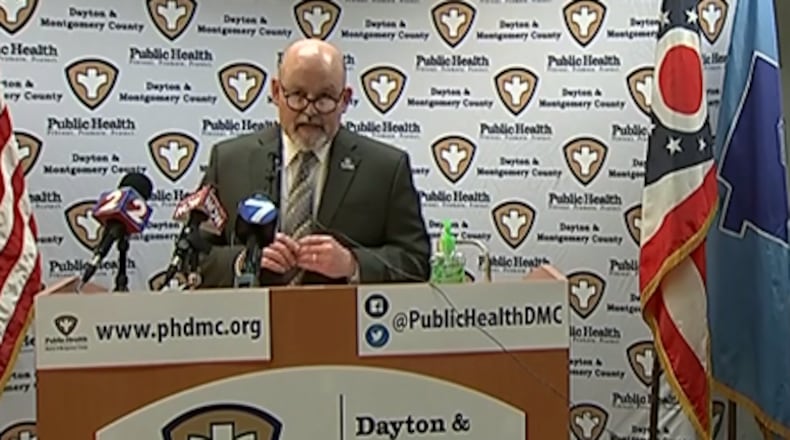The cases involve six women and seven men, with two of those 13 hospitalized, he said.
“Obviously, our true numbers are much higher,” said Cooper, who noted that not everyone is being tested, and some are asymptomatic.
>> Coronavirus: Complete coverage
Tuesday is the first day Ohio’s stay-at-home order has been in effect, which lasts through April 6.
“It is very clear that non-essential businesses and operations must cease,” he said.
Businesses must provide a safe work environment.
It is up to the business to read the order to determine whether it fits in the category of essential businesses.
“To the extent possible, all workers must be working from home,” Cooper said.
Ideally, people are adhering to the stay-at-home order, and businesses are focused on the safety of their workforce, he said.
However, Dayton Mayor Nan Whaley said many calls are coming in to the city and health department from people who feel their employers are not essential or are not providing a safe environment.
If non-essential operations continue, by statute boards of health may declare emergency orders and regulations to cease operation, and work with the prosecutor’s office for penalties, should it come to that, Cooper said.
Only essential businesses should be open, and Cooper said one sector is definitely not exempt, and that is lawn care services.
The city of Dayton sent home approximately 600 non-essential staff, which represents about one-third of the city’s workforce, City Manager Shelley Dickstein said.
“We are trying to do our part,” she said.
It is effective up to April 13.
“All of our 1,900 employees are critical and valuable and an essential part of our team in serving our 141,000 citizens. However, at this time for the critical mission of this emergency we were able to identify about 30 percent that we believe that we can send home,” Dickstein said.
Dayton Public Schools Superintendent Elizabeth Lolli said that during the Wednesday lunch and breakfast distribution, students will receive backpacks filled with school supplies donated by Crayons to Classrooms.
One disturbing trend is that overdoses are rising during this crisis, Helen Jones-Kelly director of Montgomery County Alcohol, Drug Addiction & Mental Health Services.
“We would encourage people to reach out ... be in constant communication,” she said.
The Warm Line at 937-224-4646 is available to provide urgent, emotional support for people struggling with addiction and mental health issues. There also are coronavirus coping tips and a Get Help Now app on the agency's website.
For those who want to know how they can help during this time, Sarah Hackenbracht, president and CEO of the Greater Dayton Area Hospital Association, has one plea.
“We ask you simply to stay home,” she said.
Hackenbracht said that people in the community have been stepping up to help make sure there isn't a regional blood supply shortage. Right now, the Community Blood Center has about an eight- to 14-day supply. She encouraged people to donate, but to plan ahead by making appointments by calling 937-461-3220 or donortime.com.
>> DP&L employee tests positive for coronavirus
Those who also spoke were Phil Parker, president of the Dayton Area Chamber of Commerce, Paula Thompson, president and CEO of Fidelity Health Care, which operates Premier Urgent Care, Teresa Williams of CompuNet Clinical Laboratories and Rick Krysiak, University of Dayton’s vice president for facilities management and planning.
About the Author
